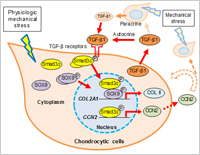Enlarge Image
Why physiologic mechanical stress is important in enhancing chondroprotective gene expression: Stretch-mediated activation of TGF-β-Smad2/3 pathway
Articular cartilage is subjected to a wide range of biomechanical stresses such as static/dynamic loads, compressive force, shear strain, tensile strain, hydrostatic pressure, fluid flow, and osmotic stress. Such physiologic mechanical stress stimulates the expression of chondrogenic genes, such as multifunctional growth factor CYR61/CTGF/NOV (CCN) 2 and α1(II) collagen (COL2A1), and maintains cartilage homeostasis. On the other hand, repetitive excess mechanical stress can alter cartilaginous composition and metabolism, and lead to osteoarthritis.
Takayuki Furumatsu and colleagues have previously demonstrated that cyclic tensile strain (CTS) induces nuclear translocation of transforming growth factor (TGF)-β receptor-regulated Smad2/3, and the master chondrogenic transcription factor Sry-type HMG box (SOX) 91, 2). However, the precise mechanism of stretch-mediated Smad activation remains unclear in transcriptional regulation of chondrogenic genes. Here, to elucidate this stretch-dependent transcriptional mechanism, the researchers hypothesized that physiologic tensile strain may induce TGF-β1 release from chondrocytic cells and stimulate Smad-dependent chondroprotective gene expression in chondrocytic cells.
In the Journal of Biomechanics3), the Okayama University group demonstrated that uni-axial CTS (frequency, 0.5 Hz; strain, 5% elongation) increased TGF-β1 secretion and stimulated expression of chondroprotective genes (CCN2 and COL2A1) in chondrocytic cells. Nuclear translocalization of Smad2/3 and SOX9 were also stimulated by CTS. In addition, CTS increased the complex formation between phosphorylated Smad2/3 and SOX9 in chondrocytic cells. The CCN2 promoter activity was cooperatively enhanced by CTS and Smad3 in luciferase reporter assay. Chromatin immunoprecipitation assay revealed that CTS increased Smad2/3 interaction with the CCN2 promoter and/or the COL2A1 enhancer (Figure).
These results suggest that physiologic mechanical stress epigenetically stimulates CCN2 transcription via TGF-β1 release associated with Smad2/3 activation and enhances COL2A1 expression through the complex formation between SOX9 and Smad2/3.
Reference:
1
Authors: Tomoko Kanazawa, Takayuki Furumatsu, Motomi Hachioji, Toshitaka Oohashi, Yoshifumi Ninomiya, and Toshifumi Ozaki.
Title of original paper: Mechanical stretch enhances COL2A1 expression on chromatin by inducing SOX9 nuclear translocalization in inner meniscus cells.
Journal, volume, pages, and year: J Orthop Res 30, 468-474 (2012).
Digital Object Identifier (DOI): 10.1002/jor.21528
2
Authors: Takayuki Furumatsu, Tomoko Kanazawa, Yoshiaki Miyake, Satoshi Kubota, Masaharu Takigawa, and Toshifumi Ozaki.
Title of original paper: Mechanical stretch increases Smad3-dependent CCN2 expression in inner meniscus cells.
Journal, volume, pages, and year: J Orthop Res 30, 1738-1745 (2012).
Digital Object Identifier (DOI): 10.1002/jor.22142
3
Authors: Takayuki Furumatsu, Emi Matsumoto, Tomoko Kanazawa, Masataka Fujii, Zhichao Lu, Ryotaro Kajiki, and Toshifumi Ozaki.
Title of original paper: Tensile strain increases expression of CCN2 and COL2A1 by activating TGF-β-Smad2/3 pathway in chondrocytic cells.
Journal, volume, pages, and year: J Biomech 46, 1508-1515 (2013).
Digital Object Identifier (DOI): 10.1016/j.jbiomech.2013.03.028
http://ousar.lib.okayama-u.ac.jp/metadata/51099
Author website(Japanese): http://www.okayama-u.ac.jp/user/med/orthop/japanese/index.htm
Takayuki Furumatsu, M.D., Ph.D.
Department of Orthopaedic Surgery, Science of Functional Recovery and Reconstruction, Okayama University Graduate School of Medicine, Dentistry, and Pharmaceutical Sciences, 2-5-1 Shikata-cho, Kita-ku, Okayama 700-8558, Japan
Tel.: 81-86-235-7273; Fax: 81-86-223-9727; E-mail: matino@md.okayama-u.ac.jp

